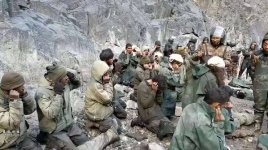Saif
Senior Member
- Jan 24, 2024
- 12,724
- 7,062
- Origin

- Residence

- Axis Group

Date of Event:
Jan 2, 2025
Nuclear deterrence
Aizaz Ahmad Chaudhry 27 May, 2024, 00:00
FIFTY years ago, in May 1974, India detonated its first nuclear device, calling it Operation Smiling Buddha. While the world remained largely silent, Pakistan's foreign minister declared Pakistan would 'never submit to nuclear blackmail' or 'accept Indian hegemony over the subcontinent'. Earlier, Zulfikar Ali Bhutto had expressed the resolve that if India ever built a nuclear weapon, Pakistan would 'eat grass', but build one of its own. Given India's role in dismembering the country in 1971, the Pakistani leadership found it imperative to restore the power equilibrium by nuclear capability to deter further Indian aggression.
In 1998, South Asia became overtly nuclearised. On May 11, 1998, India tested its nuclear devices. Given the significant conventional asymmetry, Pakistan followed suit on May 28 as it could not remain vulnerable. Its nuclear tests restored the strategic balance and re-established nuclear deterrence, which essentially means deterring an adversary from conventional or nuclear aggression due to concerns that there would be retaliation that could eventually lead to mutual assured destruction.
Nuclear weapons are political weapons, ideally not intended for war-fighting. Their main purpose is to deter wars. Since 1998, South Asia has not seen a major war, primarily due to nuclear deterrence. However, nuclear deterrence could not prevent confrontations below the nuclear overhang — for instance, clashes in Kargil in 1999, troops mobilisation in 2001–2, and Indian aggression in Balakot in 2019. While none of these confrontations assumed the proportions of a major war, owing to nuclear deterrence, the risk of kinetic confrontations escalating into the nuclear dimension could not be ignored. With India's aggressive doctrines like Cold Start, Pakistan opted for a full-spectrum deterrence posture, while remaining within the ambit of credible minimum deterrence to deter all aggression — from tactical to strategic level.
To read the rest of the news, please click on the link below.
Aizaz Ahmad Chaudhry 27 May, 2024, 00:00
FIFTY years ago, in May 1974, India detonated its first nuclear device, calling it Operation Smiling Buddha. While the world remained largely silent, Pakistan's foreign minister declared Pakistan would 'never submit to nuclear blackmail' or 'accept Indian hegemony over the subcontinent'. Earlier, Zulfikar Ali Bhutto had expressed the resolve that if India ever built a nuclear weapon, Pakistan would 'eat grass', but build one of its own. Given India's role in dismembering the country in 1971, the Pakistani leadership found it imperative to restore the power equilibrium by nuclear capability to deter further Indian aggression.
In 1998, South Asia became overtly nuclearised. On May 11, 1998, India tested its nuclear devices. Given the significant conventional asymmetry, Pakistan followed suit on May 28 as it could not remain vulnerable. Its nuclear tests restored the strategic balance and re-established nuclear deterrence, which essentially means deterring an adversary from conventional or nuclear aggression due to concerns that there would be retaliation that could eventually lead to mutual assured destruction.
Nuclear weapons are political weapons, ideally not intended for war-fighting. Their main purpose is to deter wars. Since 1998, South Asia has not seen a major war, primarily due to nuclear deterrence. However, nuclear deterrence could not prevent confrontations below the nuclear overhang — for instance, clashes in Kargil in 1999, troops mobilisation in 2001–2, and Indian aggression in Balakot in 2019. While none of these confrontations assumed the proportions of a major war, owing to nuclear deterrence, the risk of kinetic confrontations escalating into the nuclear dimension could not be ignored. With India's aggressive doctrines like Cold Start, Pakistan opted for a full-spectrum deterrence posture, while remaining within the ambit of credible minimum deterrence to deter all aggression — from tactical to strategic level.
To read the rest of the news, please click on the link below.
Last edited:








